Zucchini is used in savory soup, crisps, pancakes, and several dishes. The zucchini plant’s blossoms often grace the blossom end of the fruit before developing into delicious vegetables. But what will you do if the Zucchini plant is not producing fruits in your veggie garden? Let’s understand the reasons behind it and the solutions.
If your Zucchini plant is not producing fruit, the most common reasons are poor pollination, bad weather, insufficient sunlight, pests and diseases, or poor seed quality. Consider hand pollination, ensure adequate sunlight, check for pests and diseases, and use viable seeds from reputed companies.
Are your Zucchini plants not producing any fruits despite proper care and maintenance of your vegetable garden? This article explains a few top reasons why your Zucchini plant is not producing and what can be done to increase fruit production. Let’s proceed without further delay to become a master gardener.
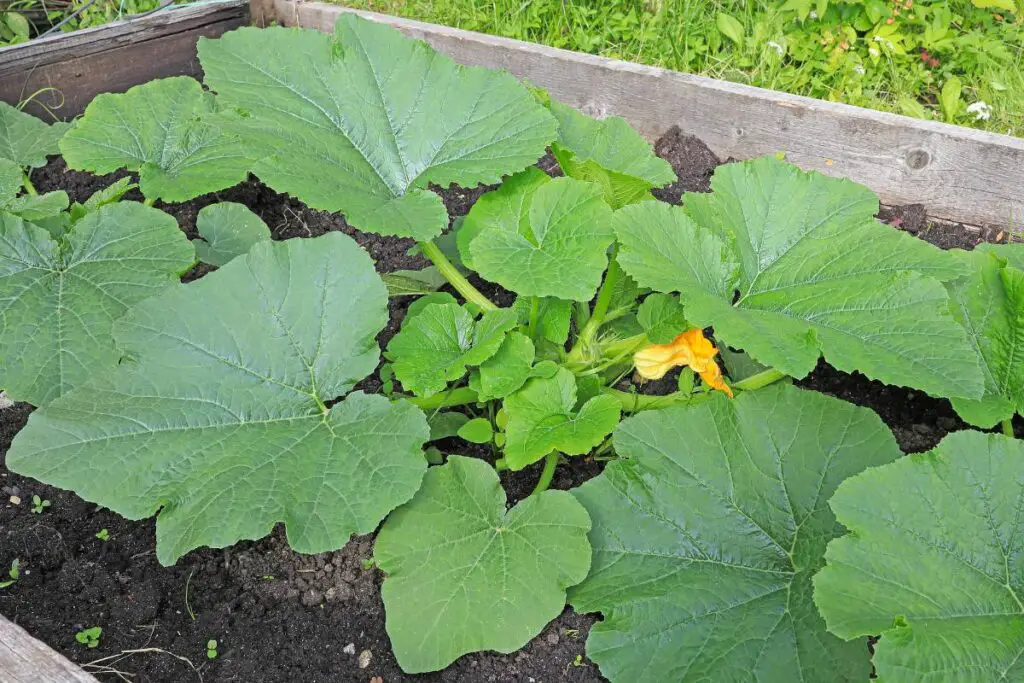
Zucchini plants not producing fruit due to the lack of pollination
Zucchinis depend on pollination for fruits. Without this, the plant will not produce any fruits.
Lack of pollination is one of the common reasons behind no fruits and can occur due to several reasons:
- Have you used pesticides recently? That is what is stopping the pollinators from visiting your garden.
- Another reason can be not ample flowers present in your plant.
- Zucchinis grow both female and male zucchini flowers varieties of flowers in the same plant for pollination. But there won’t be any pollination if you have only male or female flowers.
- Low bee activity in your house or your specific region might be causing your Zucchinis not to produce fruits.
- Poor weather conditions won’t encourage bee activity, causing poor pollination.
- The pollinators are primarily active during the early morning hours. If you water your Zucchini this time, you are scaring them off. So, they can’t help in pollinating.
The role of pollination in Zucchini fruit development
The Zucchini plant relies solely on pollination to produce fruits.
Therefore the pollen of squash plants is the most vital part when it comes to fruit production.
It is an integral process in actual fruit production.
Without pollination, you won’t see any fruits. Pollination happens through natural agents like air, wind, or pollinators.
Pollinators and pollination techniques
Pollinators like bees and butterflies contribute more to pollination.
They carry the pollen from the male blossoms to the female flower.
Pollination occurs after the pollen from the male flower’s anther reaches the female blossom stigma.
Soon, you will see new Zucchinis from the female flower’s base.
Encouraging Zucchini pollination
To encourage the bees and butterflies to visit your garden and help the Zucchini in pollination, avoid using strong pesticides in your garden.
If any plant is infested, you need to spray pesticides.
In that case, isolate and treat it somewhere else.
Plant flowering plants that can encourage pollinators, for example, lavender, nasturtiums, sunflowers, echinacea, zinnias, Calamintha, nepeta, and marigolds.
If the bee count is less, consider hand-pollination.
Collect the pollen from the male zucchini flower using a small paint brush or cotton and rub it on the female flowers.
I have encountered this issue once.
The Zucchinis were flowering, but the weather suddenly went gloomy and stayed like that for days.
As a result, I couldn’t see any bees visiting my garden.
So, I had to hand-pollinate them. The work is tricky and time-consuming.
You need to identify the male and female flowers and then transfer the pollen from one flower to another.
But the result was amazing.
I received fruits just like I used to receive through natural pollination methods.
So, I did not mind putting the time and effort behind the process.
Zucchini plant not producing fruit due to poor weather conditions
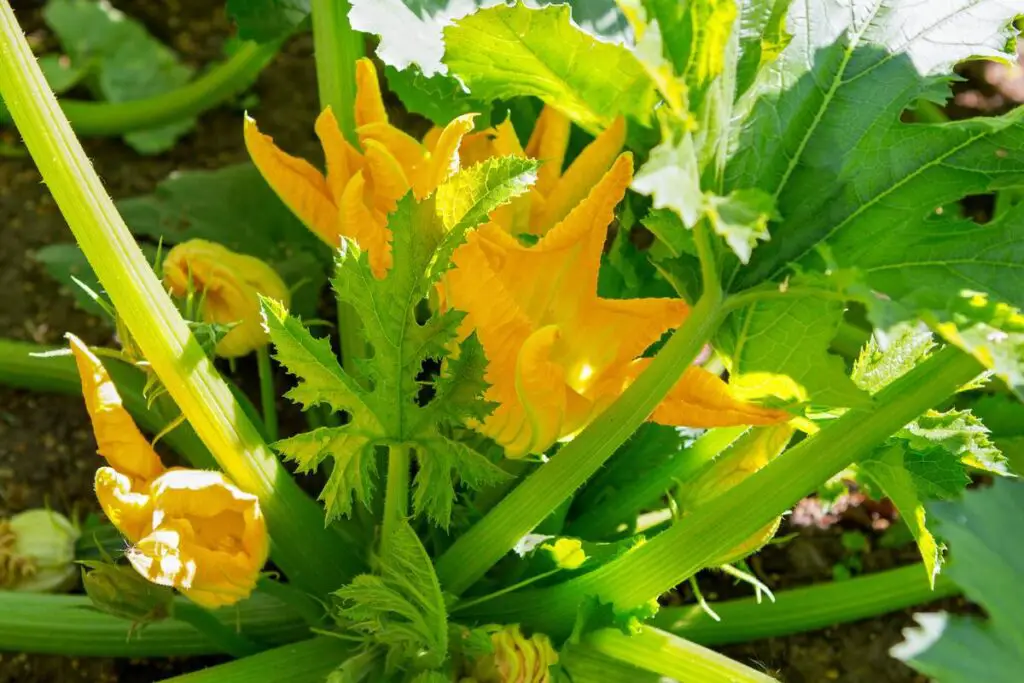
Extreme weather conditions can be harmful to the Zucchini plants, especially when it comes to crop output.
During the flowering and fruit stage, the best temperature is between 70-90°F.
Extremely high temperatures, like 95-100°F, will stress the plant too much.
High temperatures can lead to flower drops, both male and female.
So, there won’t be any fruit production.
Even if the plant manages to produce fruits, it will drop off before they develop well.
Gloomy weather or heavy rainfall also discourages pollinators from visiting your garden.
In such cases, patience is essential as there is no immediate solution.
Either wait for the weather to normalize or go for hand-pollination.
If the temperature is scorching, increase watering, put up a shading cloth, and add a layer of mulch for your Zucchini bed.
Low temperatures can also affect fruit production.
It happens when you plant the Zucchinis too early.
Low weather can stress the plant and expose it to frostbite, affecting its growth and fruiting.
Cover the Zucchinis with frost covers and add a thick mulch once the temperature goes below 45-50°F.
Zucchini plant not producing fruit due to insufficient sunlight
Lack of sunlight will not only reduce fruit production but also the plant’s overall growth and development.
Sunlight helps in photosynthesis, where the plants convert the light energy into chemical energy and encourage growth and fruiting.
Without enough sunlight, the Zucchini plant will become weak, stunted, have chlorosis, and fail to produce flowers or fruits.
Looking for gardening supplies? We have tested 100's of products before recommending them to you guys. Check out our best pick below:
| Image | Gardening Supplies | Best Price? |
|---|---|---|
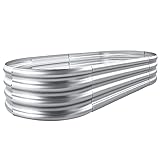 Top
Top Top
Top | Raised Garden Bed Kit | Check On Amazon |
 | XLUX Soil Moisture Meter, Plant Water Monitor, Soil Hygrometer Sensor for Gardening, Farming, Indoor and Outdoor Plants, No Batteries Required | No Results |
 Top
Top Top
Top | 82 Pcs Garden Tools Set and Extra Succulent Tools Set | Check On Amazon |
 | Joeys Garden Expandable Garden Hose with 8 Function Hose Nozzle, Lightweight Anti-Kink Flexible Garden Hoses, Extra Strength Fabric with Double Latex Core, (50 FT, Black) | No Results |
 Top
Top Top
Top | Dual Chamber Compost Tumbler | Check On Amazon |
 Top
Top Top
Top | Sunnyglade Plant Stakes | Check On Amazon |
 Top
Top Top
Top | Organic Cold Pressed Neem Seed Oil | Check On Amazon |
 Top
Top Top
Top | Mighty Mint Gallon :-Insect and Pest Control Peppermint Oil | Check On Amazon |
 Top
Top Top
Top | Scotts DiseaseEx Lawn Fungicide | Check On Amazon |
 Top
Top Top
Top | Jacks Classic 20-20-20 All Purpose Fertilizer | Check On Amazon |
 Top
Top Top
Top | 30,000 Seeds Pollinator Attracting Wildflower Mixture | Check On Amazon |
 Top
Top Top
Top | Survival Vegetable Seeds Garden Kit-Over 16,000 Seeds | Check On Amazon |
Zucchini plant sunlight exposure
Zucchinis will require 6-8 hours of direct sunlight daily.
If not this much, at least 4-6 hours is mandatory.
If the weather is scorching, ensure they receive at least 4 hours of direct sunlight daily and indirect sunlight the rest of the day.
If your Zucchini is not producing any fruits, check the light conditions.
You can transfer your Zucchini to a sunny location or use outdoor Grow lights to give them the missing light.
If you have limited Zucchini in pots, transfer will be easier.
Over time, you will witness flowers and fruits.
Zucchini plant not producing fruit due to inadequate soil nutrients and fertilization issues
Zucchinis require well-drained, fertile soil with 6.5 to 7 pH levels.
Poor soil conditions cause the Zucchini plants to fail to develop fruits.
Zucchinis will survive in ordinary soil without fertilization, but they won’t be healthy, and you won’t witness any fruits or flowers.
Before you sow the seeds, prepare the soil and make it ideal for them.
You should add organic matter and some fertilizers and prepare the soil for Zucchini before planting.
This will make the soil healthy and good for the Zucchini’s growth and food production.
I also prefer adding some chicken pellets to increase fertility.
This is entirely optional.
You need to fertilize because soil alone cannot provide all the nutrients.
They deplete over time due to regular watering.
Please don’t fertilize them right after planting.
Begin feeding the plant when they reach a few inches tall and grow profusely.
Fertilization will boost the plant’s growth and encourage lots of fruits.
Feed the plant every 2-3 weeks with a balanced liquid fertilizer.
Don’t over-fertilize; that can also stress the plant and stop fruiting.
Zucchini plant not producing fruit due to watering issues
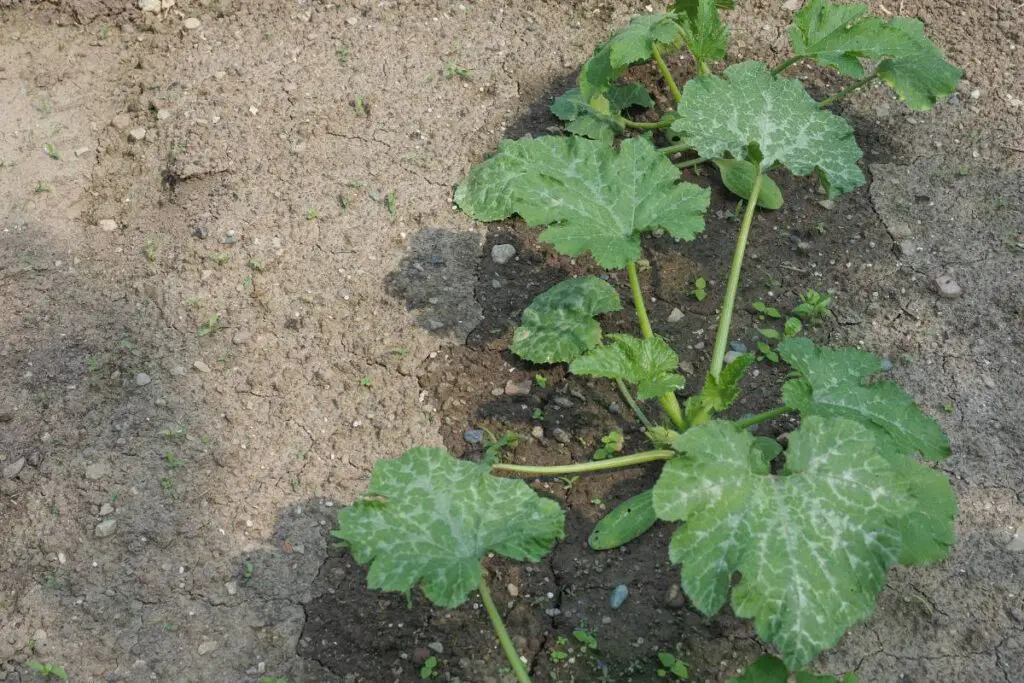
Zucchinis enjoy well-drained soil that stays evenly moist throughout.
Inconsistent watering can cause calcium deficiency. This can cause blossom end rot hence no fruit.
Soggy or waterlogged soil can stress the plant and lead to root rot.
With soggy soil, the roots will suffocate and fail to pass the nutrients and moisture to the other plant parts.
For this, the plant won’t produce any fruits.
At the same time, underwatering does the same.
The fruits are heavy due to the moisture content.
That’s how you enjoy the Zucchinis.
The Zucchini plant needs enough moisture to produce fruits.
When you don’t water the plant well, it won’t produce any fruits.
Check the soil with your finger if you don’t see any fruits in your plant.
The top few inches should be dry.
If it isn’t, wait some more days to water the plant.
If the soil is the issue, add organic matter.
It can improve both retention and drainage.
Zucchini plant not producing fruit due to pest infestations
Numerous pests can visit your Zucchini growth, especially when it is stressed.
Aphids, whiteflies, cucumber beetles, vine borers, and squash bugs can harm your Zucchini in multiple ways, restricting their ability to develop fruits.
Some bugs suck the sap, some feed on the leaves, and some create tunnels inside the Zucchini stalk and cause too much damage.
These damages stress the Zucchini plant so much that it loses the energy to produce fruits.
Eventually, your plant can die.
Before you encourage fruit production, you should save your plant by eliminating these pests and their larvae:
- Isolate your plant from the others to prevent spreading. Cut off the poorly infected leaves using a pruner and throw them into the garbage.
- Shower your plant forcefully enough to dislodge the sap-sucking bugs like aphids and whiteflies. Focus under the leaves.
- Use natural pest control techniques like neem oil or insecticidal soaps and spray them on the infected leaves.
- Remove the eggs from the plant base. A small artist’s paintbrush can help. Use float coves or aluminum foil to stop the bugs from reaching your garden and laying eggs.
- Plant companion plants with strong smells, like garlic, onion, dill, lavender, sunflowers, and marigolds to deter the pests.
- Leave beneficial insects in the Zucchini bed. These will munch on the bugs and make your plant bug-free.
Zucchini plant not producing fruit due to disease problems
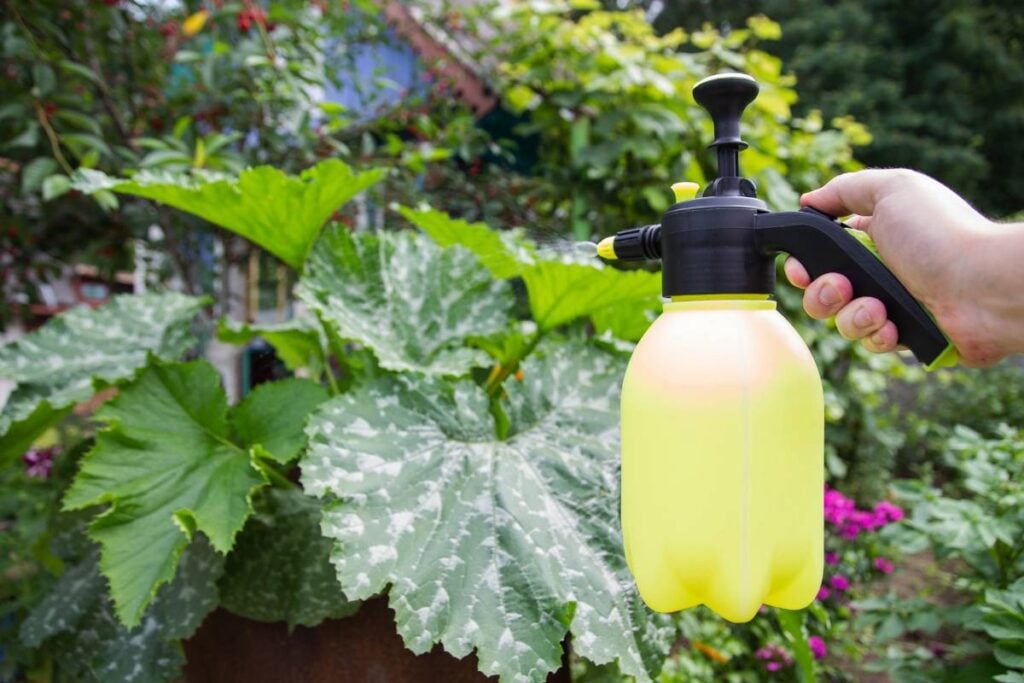
Powdery mildew, leaf spot diseases, and bacterial wilts are some of the common diseases seen in the Zucchini plant.
They negatively impact the Zucchini’s ability to produce fruits.
The diseases harm the leaves and branches, preventing nutrient and moisture absorption and stopping the plant from producing fruits.
You must isolate the plant, remove the damaged leaves, and apply some fungicides to see if the disease can be suppressed or eliminated.
Ensure proper air circulation and avoid any further stress.
Prevention is the best key.
So take good care of the Zucchini plant, and keep the surroundings clean.
Grow some disease-resistant varieties for best results.
If your Zucchini plant goes beyond saving, dispose of it in the garbage.
Please do not use any diseases or infested leaves in composting.
Zucchini plant not producing fruit due to poor seed quality
You can buy a small Zucchini plant or sow seeds to grow Zucchini.
If you use seeds, you must ensure they are viable, high-quality, and from reputed companies.
Poor and low-quality seeds can somehow germinate.
But over time, it may produce a poor quantity of fruits.
Also, these seeds can be vulnerable to several diseases.
Once your plant gets a disease, it won’t produce any fruits.
So, you must always buy viable seeds from a reputable company.
They are good-quality seeds, have a higher chance of germination, healthy growth, and lots of fruits.
Furthermore, good quality seeds can resist a lot of diseases.
Zucchini plant not producing fruit due to variety-specific factors
Certain Zucchini varieties may require time to produce flowers and fruits.
In these cases, patience and careful plant care are essential.
If your plant appears healthy and well-tended, it will eventually produce fruits. Be patient.
If your plant has recently recovered from serious issues like overwatering, pest infestation, or disease, it will also take time to produce fruit.
You have nothing to do here except wait, observe, and take good care of the plant so that it can quickly produce fruits.
Zucchini plant not producing fruit due to stress
If you have recently transplanted your Zucchinis, it may take time to produce fruit.
Zucchinis are sensitive about their roots and do not appreciate root disturbance during their growth.
It can shock and stress them, further slowing the plant’s growth and fruiting.
Since your Zucchini plant is shocked and stressed due to the transplant, give it time to heal.
Take good care of it, and avoid any further stress.
Avoid fertilizing the plant right after transplanting.
Since you will be adding organic matter, which works as a fertilizer, there is no need to fertilize them separately.
It can stress the plant and deteriorate its condition, leading to no fruit growth.
Consider proper watering and sunlight.
Feed the plant after a few weeks.
Zucchini plant not producing fruit due to inadequate or improper pruning
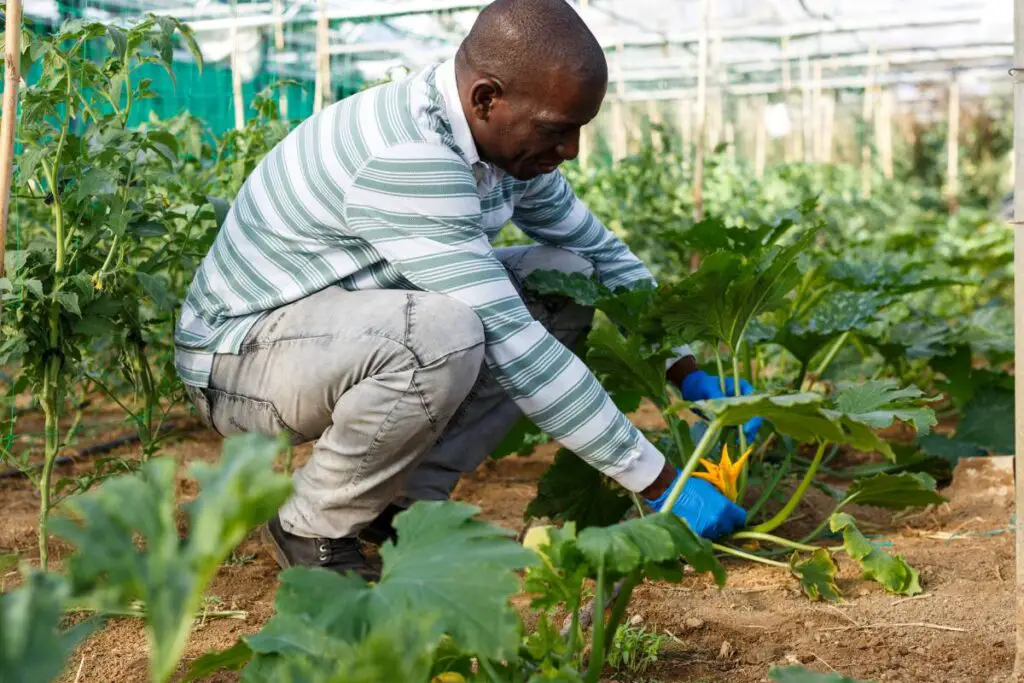
Some gardeners are unaware of this, but improper pruning can contribute to no fruit production. Here’s how:
- While pruning, you might have removed too many male or female flowers. Both are equally important for pollination and fruit production.
- Excessive pruning of flowers can deter pollinators, reducing fruit yields.
- Some beginners prune too many leaves. Leaves help in photosynthesis and use energy to support fruit development. Pruning too many leaves can result in no fruit growth.
- Not pruning the plant at all can also do the same. The plant will keep focusing on the leaves instead of the fruits. So, trimming some will keep your plant healthy, and focus on making some flowers and fruits.
- Overcrowding can cause diseases. Once the plant is diseased, it will take much time to cure, recover, and produce flowers or fruits. At times, you might not see any fruit production throughout the growing season for this.
When and how to prune Zucchini plants?
If you have improperly pruned your Zucchinis and now they are not growing any fruits, you need to be very careful about the plant’s health.
First, focus on new growth and revival. Provide proper care and maintenance, and keep observing for signs of recovery.
Once the plant recovers, you can then encourage new growth and fruits.
Correct pruning techniques can prevent this issue and encourage fruit growth.
Prune the dead, damaged, diseased leaves, flowers, and broken or dead stems.
For proper air circulation, remove only a few outer leaves.
Remove some side shoots, too.
Be careful not to hurt the main stem.
Use a pruner for a precise cut. It will avoid uneven wounds and diseases.
While cutting the leaves and flowers, leave an inch on the plant base.
After pruning, take good care of the plant to help it heal and encourage new growth.
Zucchini plant not producing fruit due to age-related factors
Zucchinis are annual plants.
Once they have finished fruit production, they will stop producing further and die.
Zucchinis have a lifespan of only one growing season, around 90 to 150 days.
After that, do not expect any yields.
Once the frost strikes your region, the plant will die.
Again, you must sow new seeds ( store-bought or saved from the previous season) to grow new Zucchini plants.
If your Zucchini is not producing, expect it has finished producing and won’t produce anymore.
Since they are annuals, they will die after providing you with numerous fruits. There is no solution for this.
Special considerations and care tips for a Zucchini that is not producing fruit
Zucchinis not producing fruits can result from several issues.
Some are related to pollination, and others are cultural and environmental factors.
Fortunately, the problems can be resolved.
All you need to do is take care of the plant and provide it with all its required resources.
Below, I am sharing some special considerations to take and care tips to maximize yields in a Zucchini that is not producing fruits:
Parthenocarpic Zucchini varieties
Taking proper care of the plant promotes pollination, leading to the production of new fruits in Zucchinis.
You can grow parthenocarpic Zucchini varieties if you are worried about pollination due to little bee activity around your house.
Parthenocarpic Zucchinis can produce fruits without the need for pollination.
Some gardeners prefer parthenocarpic varieties for culinary purposes because these fruits do not develop seeds due to the lack of pollination.
These seedless Zucchinis are smooth in texture and suitable for cooking and eating.
Some famous parthenocarpic varieties are Partenon, Cavali, and Sure Thing.
With these, you do not have to worry about pollination.
Remember that even if you do not have these varieties, you can still hand-pollinate.
The process is time-consuming and requires much effort, but the results are rewarding.
Planting multiple Zucchini varieties
Planting two different Zucchini varieties in your garden will ensure that male and female flowers open simultaneously.
Zucchinis can self-pollinate.
So, you may not require multiple Zucchinis for pollination.
However, having more varieties can improve the fruit set.
Growing multiple varieties can be beneficial if you have a Zucchini that produces female flowers late or male flowers early.
Growing multiple varieties in proximity can lead to cross-pollination, which may or may not be desirable.
Consider your preferences before attempting this technique.
Attract pollinators
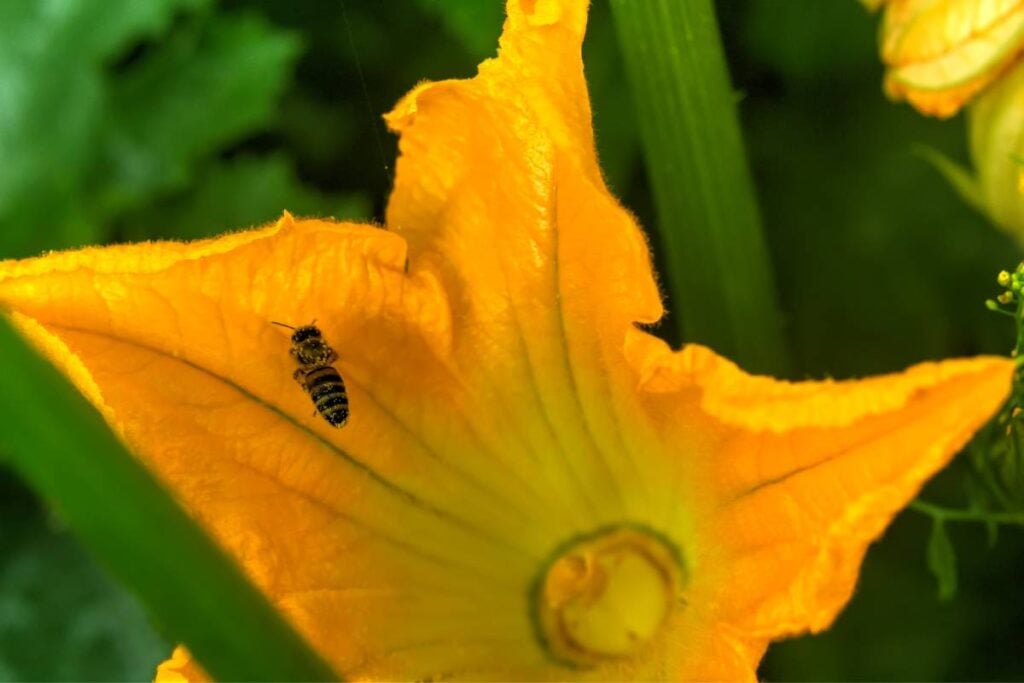
If the pollinator activity is fine in your region, but it is just the location where the plant is planted, you can attract pollinators to your garden.
Grow some flowering companions, like nasturtiums, sunflowers, and marigolds.
Since these flowers are colourful and produce a lot of nectar, pollinators will visit them.
While visiting, they will help pollinate your Zucchinis.
Avoid using any strong pesticides if you want pollinators to visit your garden.
Try to make your garden colorful and attractive so that these insects become regular guests and help in pollination.
Note: To promote healthy growth, I sprinkle a tablespoon of Epsom salt around the base of my zucchini plants every month during the growing season.
Understanding Zucchini needs and care tips to maximize Zucchini yields
Understanding Zucchini needs is one of the best ways to encourage fruit production and maximize Zucchini yields.
Here are the requirements and care tips for Zucchini that can help the plant produce fruits:
- Plant the Zucchinis, where they can receive at least 6-8 hours of sunlight. If the sun’s intensity and weather feel scorching, increase watering and use shading cloth during the hottest time of the day.
- Water the plant whenever the top few inches have dried. Zucchinis enjoy evenly moist soil, which should neither be too dry nor waterlogged.
- Use well-drained, fertile soil with 6.5 to 7 pH levels. Add organic matter to the soil before planting.
- Start fertilizing your plant once the plant reaches a few inches tall and grows vigorously. Avoid over-fertilization.
- Zucchinis rely on pollination for fruits. Ensure good pollination by attracting pollinators in your garden. Avoid using too much pesticides and grow colorful flowering companions.
- Make sure to prune your Zucchinis when they overgrow. Remove only dead and damaged leaves, flowers, and a few outer leaves for improved air circulation. Don’t prune too much.
- Buy high-quality, viable seeds from reputable companies.
- Certain Zucchini varieties have a delayed flowering and fruiting period. So be patient and wait.
- You can hand-pollinate if you have a low pollinator count in your region. If you don’t want that, grow parthenocarpic Zucchini varieties.
- If your Zucchini has finished producing enough fruit in the first year, do not expect it to produce further. It is an annual plant with a shelf life of one growing season.
- Regularly monitor your plant for signs of pests and diseases, and take immediate action as described earlier.
- Remember not to pour a gallon of water but only 2 inches at a time.
Final thoughts
Zucchini not producing fruit can result from multiple reasons. Lack of pollination is the primary cause, and several reasons are responsible for it, for example, disturbing the pollinators, poor weather conditions, and lack of male or female flowers. Try to fix these reasons to encourage pollination. You can try hand pollination as an alternative.
Other reasons include watering issues, insufficient sunlight, nutrient deficiency and fertilization problems, pests and diseases, stress, poor seed quality, improper pruning, or stress. Please find out the real cause and fix it as described in the article. Sometimes, Zucchini not producing any fruit is expected. Maybe the plant’s lifespan is over. Or, the variety you are growing takes time to produce fruits and flowers, so you need to be patient and wait.
Take good care of your Zucchini plant and provide it with all the requirements and resources. Monitor it regularly to check out for pests and diseases and take immediate action to prevent spreading.
Why is my zucchini plant flowering but not producing fruit?
There might be a lack of pollination due to the lack of bee activity. To fix this issue, you must hand-pollinate. Or, grow parthenocarpic varieties that can grow fruits without pollination.
Why is my zucchini not growing?
Lack of sunlight, water, and nutrients, pests and diseases, temperature stress, or stress can stop the Zucchini from developing. Please find the right cause, solve it, and encourage further growth.
Reference: Zucchini Wikipedia
